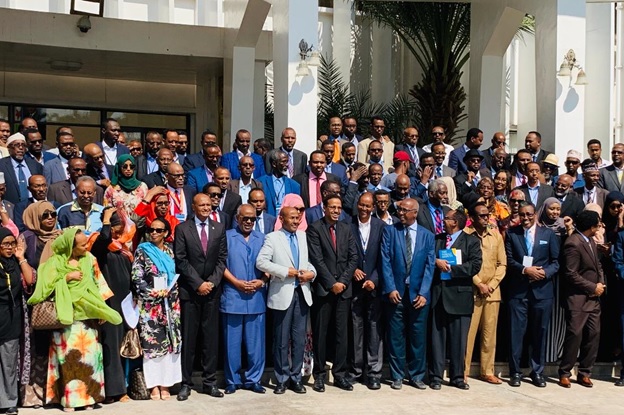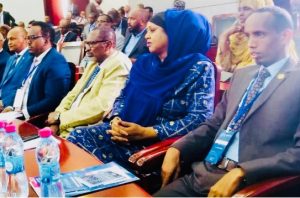By Adam Aw Hirsi
It is pleasant December night in Djibouti. Over 160 Somali senior academics, policy oriented politicians, eminent personalities, senior business executives, current and former senior government officials, international strategists from the East African region and all over the world are gathered by the poolside of Sheraton Hotel in Djibouti. I happened to be one of the crowd. In fact this is not my first time coming here for the same purpose. With the magnanimous hosting of President Ismail Omar Guelleh of Djibouti, The Heritage Institute for Policy Studies (HIPS) has convened this Annual Forum for Ideas (AFI) for the second year in a row, and just like I did last year, here I am.
 Towards the end of the second day of the forum, after few extensions of the time allotted, the participants could not get enough of the debate over Hargeisa’s quest for secession and Mogadishu’s insistence on unity. The Executive Director of Heritage, former Federal Government cabinet member and a policy wonk in his own right, Abdirashid Hashi, has suggested that we continue this lively debate at a later day. And amid an applause of acceptance, Hashi further suggested that we convene over dinner and proceed on this very issue on Monday night.
Towards the end of the second day of the forum, after few extensions of the time allotted, the participants could not get enough of the debate over Hargeisa’s quest for secession and Mogadishu’s insistence on unity. The Executive Director of Heritage, former Federal Government cabinet member and a policy wonk in his own right, Abdirashid Hashi, has suggested that we continue this lively debate at a later day. And amid an applause of acceptance, Hashi further suggested that we convene over dinner and proceed on this very issue on Monday night.
This is that Monday night, December 17 2018. A panel of six people has been formed and assembled on a perch nearby, and every one of them took five minutes to make their oral presentation. Abdi Aynte, a founding member of Heritage, former federal minister and currently a UN senior official who was moderating the session took up the microphone and thanked the panel and the rest of the gathering.
When the floor was opened for what was termed as “expert opinions,” I raised my hand and after few other speakers, was granted a precious minute to sound off – Aynte has once again proven stingy on time.
After a terse opening remarks, I went for the jugular: “I always say about the Somaliland issue – in Arabic – “staying together in harmony, or divorcing in an unambiguous clean manner.” At this point, someone in the crowd reminded me that I was reading a verse in the Noble Quran, to which I responded “I do know, I do know.” Gaggle burst in laughter.* Unabated I continued.
“First of all, let us all be clear, the Somaliland issue must occupy the front and center of Somalia policy makers. Without a clearly stated and spelled out policy on Somaliland in Villa Somalia and Villa Hargeysa, our collective state of affairs will remain as they are. And the current state of affairs benefits neither of us. Things should move forward in one way or the other. Also, let me weigh in on some of the demonstration of love and brotherhood shown in Palais du Pueple yesterday. While goodwill is always good, reservations are warranted against basing people’s future on mere emotions. Haven’t we been there in 1960? I don’t think we want our children to have a similar type of flare-up to the one we are having now in 50, 60, or 70 years down the road. I suggest that we put this unfortunate Humpty Dumpty back together – if we have to – in a clear step-by-step crack-proof and meticulous way. And let us always keep our eyes on the fatal fault-lines.
Secondly, I want to state one other fact that Suad Odowa and her fellows from Somaliland need to know, and the rest of the crowd will bear my witness. There are secessionists in the South. Yes, many politicians in Mogadishu want or are complacent about this country being divided into two. I wonder why your (Northern secessionists) strategists did not identify those reticent but resourceful allies of their cause. It is no longer secret that those Southern politicians in power now and fore had intentionally sidelined the unionists from the regions that constitute Somaliland. For so long now, the appointments of senior Federal Government positions were made at the behest of Hargeysa power centers; at least Hargeysa was granted the right of refusal in the Federal Government senior positions.” At this juncture of my remarks, I was told from a competing and louder mic that I exceeded my time for 15 seconds. I thanked the panel for the opportunity to opine and sat down.
Had I been given an adequate time, this is what I would say: “Unity” was prominent in President Hassan Sheikh Mahmoud’s Six Pillars. There must have been an agenda towards that very end: the territorial integrity of the country. I haven’t seen that agenda, and I haven’t seen anyone who did see it. But from my vantage point at the Prime Minister’s Office where I worked as a senior policy advisor, I could sense and was incensed by a pattern where Villa Somalia consistently shunned and discounted the vocal prominent unionists from the former British Protectorate altogether. The same pattern continues to this day. Let us all be mindful to its merits and demerits.
My remarks would end here.
 Now while we are at it, there was a time in 2013 I was asked (or rather tasked with) to produce a white paper on Somaliland issue.
Now while we are at it, there was a time in 2013 I was asked (or rather tasked with) to produce a white paper on Somaliland issue.
My short paper titled “The Deft Approach to Somaliland Issue: Deescalate, Study & Approach” took me three months to research and put it together. If the reason behind tasking me with this cumbersome issue was to alleviate my grumble about the prevailing practice I can not tell. And how on Earth that simple hand-delivered paper written by this small fish ended up in Hargeysa is better made a story for another day.
Years after I had left the federal government, I asked one of the closest allies of President Mohamud their rationale of the time for alienating the faithful, the Northern unionists. The former Villa Somalia official defensively reminded me that my paper suggested that Mogadishu deescalates. “Appointing people Hargeysa didn’t like could easily rock the boat and interrupt the talks,” he quipped.
“Paper didn’t suggest that you ditch your allies; deescalation in rhetoric and granting Somaliland an easy access to essentials like aid, aviation, passports was the moral of the proposal. In no way it meant debasing your cause,” I demurred. “And by the way your practice preceded the damn paper,” I retorted.
Adam Aw Hirsi
—————
Mr. Aw Hirsi is the Minister of Planning & International Cooperation, Jubbaland State of Somalia. Aw Hirsi can be reached at [email protected]. You can also follow him on #Twitter @JustAwHirsi
We welcome the submission of all articles for possible publication on WardheerNews.com. WardheerNews will only consider articles sent exclusively. Please email your article today . Opinions expressed in this article are those of the author and do not necessarily reflect the views of WardheerNews.
WardheerNew’s tolerance platform is engaging with diversity of opinion, political ideology and self-expression. Tolerance is a necessary ingredient for creativity and civility.Tolerance fuels tenacity and audacity.
WardheerNews waxay tixgelin gaara siinaysaa maqaaladaha sida gaarka ah loogu soo diro ee aan lagu daabicin goobo kale. Maqaalkani wuxuu ka turjumayaa aragtida Qoraaga loomana fasiran karo tan WardheerNews.
Copyright © 2024 WardheerNews, All rights reserved


